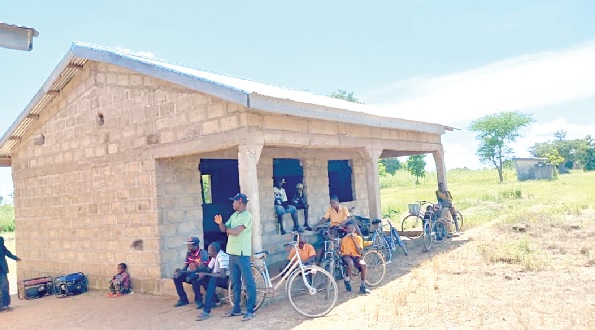Communal spirit bringing change to Longsa community
WHAT began as a mere discussion among a few concerned residents and stakeholders has grown into a movement of collective action at Longsa, a farming community in the Builsa North Municipality in the Upper East Region.
For now, residents of the community are experiencing a sense of ownership and pride as they work collectively to champion the cause of development in the area.
One of the key interventions being undertaken is the construction of a Community-Based Health Planning Services (CHPS) compound to improve access to healthcare in the community.
For many years, the community has been struggling with a lack of access to quality healthcare.
The situation has forced many to trek long distances to access health care while others rely on local medication, which is often life-threatening.
So far, they have been able to mobilise their own resources to put up the facility without any external support.
The local artisans within the community are using their skills to build the facility while farmers and labourers contribute by working on-site or offering materials and financial support.
Currently, they have been able to raise the structure to the lintel level, with the next stages being roofing, plastering and finishing touches.
Community Excellence Programme
The residents developed a communal spirit after UNICEF and its partners sensitised them to take charge of their own development affairs.
The initiative is called the "Community of Excellence Programme (CEP)" and encourages local communities to lead their own development projects to ensure sustainability.
The programme, which started in 2022, is funded by the Jacobs Foundation, a Zurich-based philanthropic organisation. It is being implemented in the Builsa North Municipality in the Upper East Region and Kwahu Afram Plains North Municipality in the Eastern Region.

The Assemblyman for the Wiaga/Longsa Electoral Area, Atayaaba Justus Triumph, said the intervention had inculcated a communal spirit in the residents to initiate their own development projects.
"For now, the people understand what it means for them to lead their own affairs. Every single person has contributed, whether it’s through labour, materials or even cooking for those working on the project," he said.
He said attempts to get authorities to provide them with a health facility over the years had not been successful and so they had now decided to construct their own facility.
Other projects
Aside from the construction of the health facility, residents have also mobilised to construct a three-unit classroom block to augment an existing infrastructure at the Longsa Primary School.
Additionally, they have been able to renovate several schools and provide furniture, water, sanitation and hygiene (WASH) facilities in the area.
The Headmaster of the Longsa Primary School, Joseph Ateng, said the intervention had increased enrolment and academic outcomes in the school.
He said hitherto, parents did not have an interest in running the affairs of the school, but now they had developed such interest.
Impact
For his part, the Focal Person for the CEP in the Builsa North Municipality, Kennedy Afagachie, indicated that the programme had benefited about 14,571 students, adding that about 175 school management committees (SMCs) and parent-teacher associations (PTAs), with an estimated membership of 12,743, had been activated.
He indicated that enrolment at the kindergarten level had increased from 70.8 per cent to 77.8 per cent in 2023 while enrolment had also soared from 68 per cent in 2022 to 83.3 per cent at the primary level.
The Education Officer at UNICEF, Gloria Tisong DaKpallah, said the active participation and ownership of development projects was very crucial to their sustainability.
She, therefore, commended all stakeholders for their support towards the success of the project.
